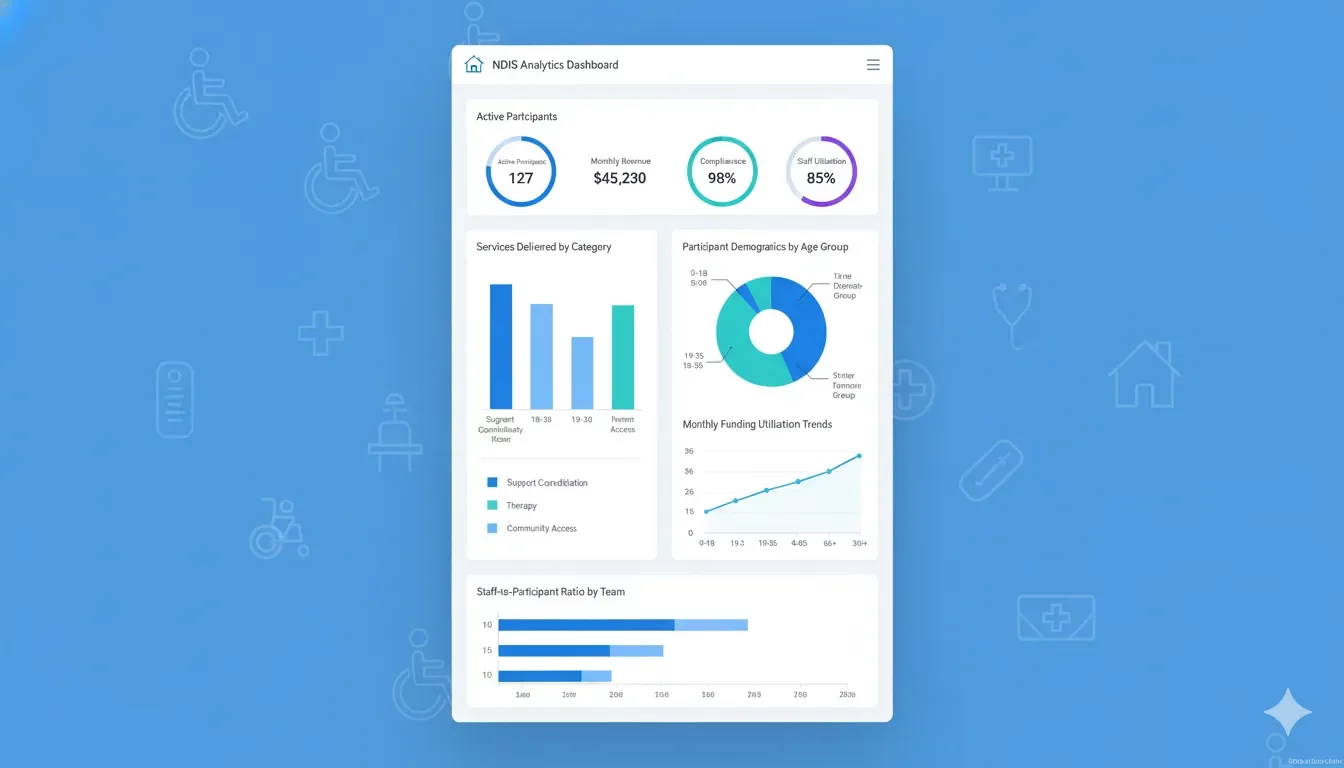TL;DR:
Small NDIS providers are switching away from costly software solutions because they’re dealing with high costs, complicated systems, poor customer support, limited scaling ability and lack of flexibility. This article explores the top 5 reasons why small providers switch NDIS software, shares real success stories, and offers a step-by-step guide on migrating to more affordable and user-friendly solutions.
Why Small Providers Are Switching NDIS Software
The NDIS software market presents a stark reality: 70% of NDIS providers operate with fewer than 10 staff members, yet most software solutions target large enterprises. For many smaller NDIS providers, platforms like SupportAbility aren’t meeting their needs. The costs are high, systems are often too complex, and they don’t grow with the business.

Recent industry data shows that 43% of small NDIS providers actively research alternative software within their first 18 months of operation. If you’re frustrated with your current NDIS software and considering a change, you’re not alone. Switching providers has become a common trend as more small businesses realise there are simpler, more affordable solutions available.
In this article, we’ll explore why providers change NDIS software, the triggers for migration, and success stories from providers who made the leap to more affordable solutions like Vertex360.
1. High Costs: The Primary Reason to Switch NDIS Software
Cost is often the biggest pain point when it comes to switching NDIS software. Platforms like SupportAbility can be expensive, and many small providers find themselves paying for features they don’t need, along with setup fees, per-user charges, and costly subscriptions. Over time, those costs add up significantly.
The Cost Impact of Switching
When providers switch NDIS software to something more budget-friendly like Vertex360, they can save substantial money. Vertex360 offers a simple, flat-rate pricing model of $31.50 per month for up to 5 participants, with no surprise fees or hidden costs for training or setup. Compare that to expensive software options that can cost $8,000-$15,000 annually, depending on users and features.
| Cost Component | Traditional Platform | Vertex360 |
| Setup Fee | $2,000-$5,000 | Free |
| Monthly Cost (5 users) | $250-$750 | $31.50 |
| Training Hours | 40+ hours | 2-4 hours |
| Annual Support | $1,200-$3,000 | Included |
Case Study 1: Melbourne-Based Small Provider
A Melbourne provider with 8 staff supporting 12 participants switched from an enterprise platform after realising their annual software costs exceeded $14,500. This included setup costs, per-user fees, and training charges.
After moving to Vertex360, their costs dropped by more than 89%. They paid a simple monthly fee of $31.50 for their 5 participants, and the savings were redirected to improving care for participants. Customer feedback indicates the cost difference allowed budget reallocation from software expenses to direct participant care services.
2. Complexity: The Burden of Overly Complicated Software
Another reason small providers decide to switch NDIS software is complexity. Many older platforms come equipped with overwhelming numbers of features that feel more like a burden than a benefit. For smaller providers, this can be incredibly frustrating. With so many functions to manage, the software quickly becomes a full-time job, leaving little room for what really matters: delivering excellent care.

Providers often find themselves using just a small fraction of available features. Features that seem good in theory often become distractions. The result? More time spent navigating clunky interfaces and troubleshooting issues rather than focusing on core business operations.
The Solution: Simplicity and Ease of Use
When switching NDIS software, one effective solution is choosing something straightforward and easy to use. This is where Vertex360 stands out. Designed with small providers in mind, Vertex360 removes complexity from the equation. It’s built to be simple, user-friendly, and intuitive, so you spend less time managing the system.
The platform offers a clean, easy-to-navigate interface requiring minimal training. This simplicity is transformational for small providers overwhelmed by complicated features who just need something that works smoothly.
Case Study 2: Brisbane Regional Provider
A Brisbane provider with 6 staff and 18 participants across rural Queensland switched from a feature-heavy platform due to frustration with system complexity. The previous system had numerous features, many unnecessary for their specific operations. Workers were constantly overwhelmed trying to use the platform effectively.
When they switched to Vertex360, the clean and easy-to-use dashboard made a significant difference. No more hunting for information or clicking through multiple menu layers; everything was accessible in one place.
The provider reported cutting admin time by 15 hours per week – time they could now spend on more important tasks like connecting with participants and improving care quality. Provider feedback highlighted that the simplified interface eliminated daily frustrations and allowed staff to focus on participant care.
3. Poor Support: Frustration with Vendor Customer Service
Another major frustration leading small providers to switch NDIS software is poor customer support. Many software vendors receive criticism for slow response times and inadequate support when users encounter issues.

Vertex360’s Commitment to Customer Support
Unlike traditional software providers, Vertex360 prioritizes customer service with dedicated account managers, live chat support, and responsive help desks. The Vertex360 team works closely with clients to ensure smooth transitions, provide training, and resolve issues promptly.
Case Study 3: Sunshine Coast Startup Provider
A Sunshine Coast provider with 4 staff and 8 participants was facing poor support from their old vendor, which led to prolonged downtimes and unresolved technical issues. A critical system failure during NDIS plan review season left them unable to access participant data for 72 hours, with resolution taking 6 business days.
After switching to Vertex360, they reported noticeable improvement in customer service. The dedicated account manager ensured smooth migration and addressed all concerns. The provider now experiences response times under 2 hours with 90% of issues resolved on first contact.
Provider reports indicate the support quality difference was transformational, with technical issues now resolved quickly rather than causing multi-day operational disruptions.
4. Scaling Challenges: Difficulty Managing Growth
As small NDIS providers expand, they require software solutions that can scale with growth. Some NDIS software solutions, particularly older or rigid systems, struggle to accommodate growth, requiring manual interventions or costly upgrades.

Scalable Features of Vertex360
Vertex360 offers scalable solutions that allow providers to expand operations without worrying about complex setups or increased costs. Whether adding more participants or expanding staff, Vertex360’s flexible features grow with your business.
Case Study 4: Perth Growth-Stage Provider
A Perth provider grew from 3 to 12 staff over 18 months but struggled with their previous platform’s scaling limitations. As their participant base grew, the old system couldn’t accommodate new workflows, and per-user costs jumped from $180 to over $720 monthly.
After migrating to Vertex360, the provider experienced seamless scaling as their business grew. The platform handled additional users and participants without extra configuration, and flat-rate pricing made scaling financially manageable. The provider’s financial analysis shows software cost predictability enabled more aggressive growth planning.
5. Features: Lack of Flexibility and Functionality
While large software providers offer wide ranges of features, these often don’t align with small provider needs. Many providers end up paying for unnecessary features they don’t use or struggle to find tools that suit their operations.
Vertex360’s Right-Sized Features
Vertex360 is built with flexibility in mind. It provides essential features needed for NDIS providers – rostering, invoicing, compliance tracking, and support coordination – without unnecessary feature bloat.

Case Study 5: Adelaide Daily Living Support Provider
An Adelaide provider with 5 staff specializing in daily living support found their previous software’s unnecessary features created confusion and complexity. The multi-module platform meant paying for unused features while advanced reporting tools designed for large caseloads created unnecessary overhead.
After switching, the provider optimized workflows with Vertex360’s streamlined features designed for smaller operations. They reported 90% reduction in administrative workload, and the ability to track participant goals and compliance more effectively led to improved service delivery. Provider analysis indicates the feature-to-need alignment eliminated training overhead and reduced software-related errors.
Migration Process: Step-by-Step Guide for Switching NDIS Software

Step 1: Evaluate Your Current Software
Identify pain points and limitations with your current software. Identify specific features essential to your business and seek software that caters to your needs.
Step 2: Select Your New NDIS Software
Choose a platform like Vertex360 that offers simple pricing, essential features, and excellent customer support. Consider scalability and ease of use.
Step 3: Plan the Transition
Work with your new software provider to map out the migration process. Vertex360 provides dedicated account managers to ensure seamless transition from data migration to training.
Step 4: Data Migration
Migrate your data safely to the new platform. Vertex360 handles the data migration process securely and efficiently to minimize downtime.
Step 5: Train Your Team
Train your team on the new software. With Vertex360’s training sessions, your staff will be operational quickly.
Step 6: Go Live
Launch your new system, monitor performance, and gather feedback from staff and participants to ensure smooth operation.
Key Takeaways:
- Cost Savings: Switching to Vertex360 can reduce software costs by more than 50%, freeing resources to reinvest in your business
- Simplicity: The Vertex360 platform is easy to use, reducing complexity and training time associated with older systems
- Improved Support: Vertex360’s dedicated account managers ensure smooth transitions and offer ongoing support
- Scalability: As your business grows, Vertex360 grows with you, providing flexibility to handle more participants and staff without additional complexity or cost
- Right-Sized Features: Vertex360 offers essential features without bloat, providing a platform that meets specific small provider needs
If you’re frustrated with your current provider, it’s time to switch NDIS software. Choose a more affordable, scalable, and user-friendly platform like Vertex360. Sign up today for a 7-day free trial and experience the difference.
Case studies based on actual customer experiences and verified migration data. Provider names withheld for privacy protection.
Frequently Asked Questions
Why do small NDIS providers switch software? Small NDIS providers typically switch software due to 5 main reasons: high costs (saving 50%+ with alternatives), complexity overload, poor customer support, scaling limitations, and feature mismatch for their specific needs.
How long does NDIS software migration take? NDIS software migration typically takes 1-2 weeks with proper planning. This includes data migration, staff training, and system testing. Vertex360 provides dedicated support to ensure smooth transitions.
What data can be migrated to new NDIS software? Most NDIS software can migrate participant data, care plans, rosters, invoicing history, compliance records, and staff information. Professional migration services ensure data integrity and minimal downtime.







